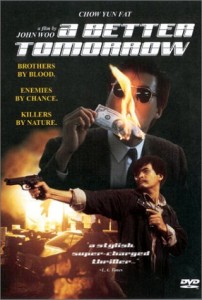 John Woo was making films for a full 20 years before he decided on a plot device that he has revisited again and again over the more successful phase of his career as an “action first / plot second” writer-director.
John Woo was making films for a full 20 years before he decided on a plot device that he has revisited again and again over the more successful phase of his career as an “action first / plot second” writer-director.
That wrinkle was to have a good guy and a bad guy exist alongside one another, and indeed even team up at times, so that the audience could see that they might not really be that different, and to lead to several stand-offs and situations where they are in close proximity.
The first notable time that occurred was in this film made in 1986, but of course Woo went back to the well with The Killer, Hardboiled and Face/Off, among others.
This film also showed that Chow Yun Fat is a cool cat regardless whether he is playing a good or a bad guy. (His presence alone made me watch Bulletproof Monk not once, but TWICE.)
____________________________________________________
In A Better Tomorrow, Yun-Fat is Mark, a small time gangster of little significance who piggybacks the success of Ho Sung, both are intimately involved in an operation counterfeiting US currency.
(Mark is cool because he wears sunnies inside and he always has a toothpick hanging out the side of his mouth, even while he is smoking.)
Ho Sung’s little bro Kit is graduating from the Police Training Academy and entering the force, and their Dad’s dying wish is that Ho Sung go straight and not allow Kit to find out what a bad guy he really is.
Ho-Sung agrees, after one last job…
Of course the “one last job” goes bad, and Ho Sung ends up in prison after his young new protégé Shing sells him out to the cops. After finding out that Ho is in da’ joint Mark puts a hit on the bad guys, and is he himself shot in the leg. ( I might add here that even if it wasn’t the first time he did it, Woo was already a fan of allowing his characters to shoot 77 rounds from a pistol without reloading.)
Fast forward 3 years >>>>>
Ho is out of prison and Kit is now a senior cop. Having copped a little grief from his peers and superiors at having a crim for a brother Kit wants nothing to do with Ho, who only wants to prove that he is true to his word and is in fact going straight.
Ho gets a job and does go straight, and when he comes across Mark he is saddened that he is now nothing more than a limping dogsbody for his new gang-boss Shing, the very guy who sold Ho out just 3 years prior.
That is a lot of stuff, apparently 3 years is a very long time in Hong Kong.
From this point the film becomes a tug of war: Ho wants nothing more than to show Kit he’s a good boy now, Shing wants Ho back in the business, as does Mark who will not be allowed in without him, and Kit just wants to bust the whole lot of them to prove he is a supercop with no family bias.
Given all that, it’s hard to see this ending happily.
_______________________________________________
The usual Woo signature flashes are present, the slo-mo violence, the generous and effective use of blood-packs and squibs to show the spurts created by some of the 77 rounds fired from each magazine, and in the Big Shootout at the end of the film Mark gets to use two pistols at once, something that he then did in every film he ended up doing with Woo.
A Better Tomorrow doesn’t hold up well unfortunately despite being seen as a genre-setting film at the time, and being namechecked by everyone and his Tarantino as being influential. It is momentously cheesy at times (see below), has some obviously clumsy direction as Woo worked on his chops and just a terrible soundtrack, somehow though it manages to be a passable flick if nothing better is available. The problem is that nowadays there should always be something better available, namely almost everything that Woo did after this, for example.
One last note: I don’t know if this is more a reflection of the 80s or Woo’s writing style but everything seems three shades of gay. I know Woo wanted to show the bond between the gangsters and early in the film between Ho and Kit, but there was just too much forced jocularity, rubbing and hugging going on with little or no justification.
Final Rating – 6 / 10. A Better Tomorrow showed signs of what was to come without ever making me Woo-zy, and it never really reaches any heights.

I agree with you that this isn’t the best Woo/Yun-Fat film (that would be The Killer for me), but seriously, you’ve got no love for that soundtrack? COME ON!
I’d push the rating up to a 7, but then I’d watch anything with Chow Yun-Fat. He is just the epitome of cool.
Thanks for reading, to be honest it’s been so long I can’t even remember the soundtrack – I have chosen to take that as a blessing.
Drop by anytime.
OGR